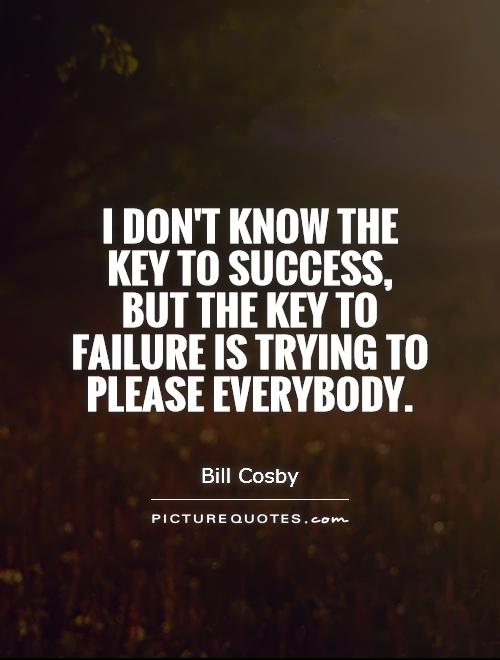I don't know the key to success, but the key to failure is trying to please everybody

I don't know the key to success, but the key to failure is trying to please everybody
Bill Cosby, once a beloved comedian and actor, is a prime example of someone who tried to please everybody and ultimately failed. Cosby rose to fame in the 1960s and 1970s with his clean-cut, family-friendly comedy routines and his groundbreaking role as the first African American lead in a television drama series, "I Spy." He continued to achieve success with his hit sitcom "The Cosby Show" in the 1980s, which portrayed an affluent African American family in a positive light.However, behind the scenes, Cosby was leading a double life. Over the years, numerous women came forward with allegations of sexual assault and misconduct against him. These allegations tarnished Cosby's once pristine reputation and led to his downfall. Cosby's downfall can be attributed to his desire to please everybody and maintain a squeaky-clean image.
Throughout his career, Cosby went to great lengths to cultivate a wholesome and family-friendly persona. He often spoke out against negative stereotypes of African Americans and promoted education and self-improvement within the black community. Cosby's desire to be seen as a role model and a positive influence on society led him to suppress his darker side and hide his predatory behavior.
In trying to please everybody, Cosby lost sight of his own moral compass and succumbed to his basest instincts. He used his power and influence to manipulate and exploit vulnerable women, all while maintaining a facade of respectability and righteousness. Cosby's downfall serves as a cautionary tale about the dangers of trying to please everybody at the expense of one's integrity and authenticity.












 Friendship Quotes
Friendship Quotes Love Quotes
Love Quotes Life Quotes
Life Quotes Funny Quotes
Funny Quotes Motivational Quotes
Motivational Quotes Inspirational Quotes
Inspirational Quotes